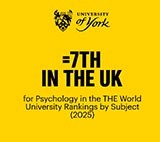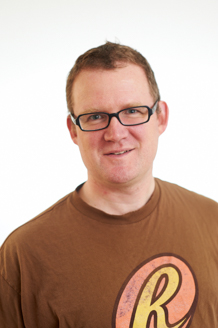
Alex Wade
Professor
Profile
Biography
University of Cambridge: BA in Natural Sciences
University College London: PhD in Neuroscience
Graduated from the University of Cambridge in 1994 with a BA in Natural Sciences. After completing a PhD in Neuroscience at University College London he moved to Stanford University to pursue a postdoctoral fellowship in human brain imaging specializing in the neural computations underlying our perception of colour. Continued this research as a Principle Investigator at the Smith-Kettlewell Eye Research Institute in San Francisco until moving to York in 2011. Current research interests include visual attention, the representation of colour and contrast in the human brain and the way in which these processes are affected by neurological diseases.
Career
Stanford University: Postdoc
Smith-Kettlewell Eye Research Institute: Senior Scientist
Research
Overview
Projects
Research group(s)
Collaborators
Available PhD research projects
Supervision
Teaching
Undergraduate
External activities
Memberships
- Optical Society of America
- Society for Neuroscience
- Society for Cognitive Neuroscience
- International Society for Magnetic Resonance in Medicine
Editorial duties
I have created and maintain websites (www.vischeck.com , www.tinyeyes.com ) that offer online simulations of color blindness, distance and infant vision free of charge. The color blindness correction algorithm is also available at www.vischeck.com/daltonize/ . This service has been mentioned in numerous reports on human factors ‘best practices’ and has been recommended by several Federal agencies including the National Oceanic and tmospheric Administration, the United States Geological Survey and ‘section508.gov’Invited talks and conferences
- ARVO Special Interest Group 05.1998 "A magnifying attachment to a scanning laser ophthalmoscope and its application to high resolution retinal imaging"
- Moorfield’s Eye Hospital, Glaucoma Group 10.1998 “High resolution in vivo imaging of the cone photoreceptor mosaic using a scanning laser ophthalmoscope”
- NASA Ames, Vision Group 04.1999 “High resolution in vivo imaging of the cone photoreceptor mosaic using a scanning laser ophthalmoscope”
- Stanford Psychology Dept 06.1999 “Imaging the cone photoreceptors in the living eye”
- SKERI, San Francisco 09.2002 “fMRI of human visual pathways”
- Lighthouse, San Francisco 11.2002 “An evening with Mike May”
- Cambridge University, Craik Club 07.2003 “fMRI of color pathways in humans and macaques”
- MRC Cognition and Brain Sciences Unit, Cambridge 07.2003 “fMRI of color pathways in humans and macaques”
- UCSF Dynamic Imaging Laboratory 03.2003 “Retinotopic mapping of human visual areas using fMRI”
- CPMC ‘Jampolsky Day’, 03.2004 “The man who learned to see”
- Stanford Neuroscience Colloquium 07.2004 “Imaging the color pathways in humans and macaques”
- ECVP, Budapest 08.2004 "Colour constancy and colour pathways in human and macaque”
- Institute of Ophthalmology, UK 09.2004 “Imaging the color pathways in humans and macaques”
- Rochester Center for Vision Science 10.2004 “fMRI in humans and macaques”
- Oxford University fMRIB 06.2006 “Imaging surround suppression with high density EEG”
- UCSF Cognitive Neuroscience Colloquium 05.2007 “High density EEG measurements of early visual processing”
- York University UK, 06.2008 “Multimodal imaging of gain control mechanisms in human visual cortex”
- Stanford University, 04.2009 “The Negative BOLD response – contrast gain not blood drain”
- Medical College of Wisconsin 06.2009 “Studying normalization processes in the human visual system using fMRI and source-imaged EEG”
- University of South Australia, Adelaide 01.2010 “Computational mechanisms of gain control measured with EEG and fMRI”
- Australian Neuroscience Society, Satellite Vision 2010 Meeting 01.2010 "Neural computations underlying the Negative BOLD response”
- Mount Lofty Interdisciplinary Neuroscience Workshop, Adelaide 12.2010 "Multimodal imaging of normal and abnormal gain control in the human brain”
Media coverage
I have made several appearances in the media in relation to my work with recovered sight patient Mike May:- Dateline Discovery Documentary (08.2001) “Mike May”
- BBC Documentary (04.2002) “The man who learned to see”
- Der Spiegel (German TV) Documentary (10.2004) “Mike May”
- Esquire Magazine (06.2005) “Blind but now he sees”

Contact details
alex.wade@york.ac.uk, wade@wadelab.net
http://www.wadelab.net
